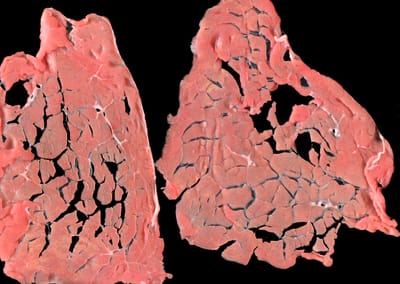Pulmonary Fibrosis


Lung fibrosis can have a number of causes, including exposure to certain chemicals, medications, infections, and diseases such as pneumonia, sarcoidosis, and rheumatoid arthritis. In some cases, the cause of lung fibrosis is unknown, and the condition is referred to as idiopathic pulmonary fibrosis (IPF).
The symptoms of lung fibrosis can develop gradually over time and can be difficult to diagnose. Some people may experience a persistent cough, while others may notice that they become breathless more easily when they are exercising or even just walking up stairs. If you are experiencing any of these symptoms, it is important to seek medical advice with Dr Aldik as soon as possible.
Treatment for lung fibrosis can depend on the cause and severity of the condition. In some cases, medication may be prescribed to help reduce inflammation and scarring in the lungs. Oxygen therapy may also be recommended to help improve breathing and reduce the risk of complications. For some people, lung transplant surgery may be necessary if the condition is severe and other treatments have been unsuccessful.
Preventing lung fibrosis is important, and there are steps that you can take to reduce your risk. This includes avoiding exposure to certain chemicals and pollutants, quitting smoking, and seeking prompt medical treatment for any respiratory infections or illnesses.
If you or someone you know is experiencing symptoms of lung fibrosis, it is important to seek medical advice with Dr Aldik as soon as possible. Early diagnosis and treatment can help to slow down the progression of the condition and improve quality of life. With the right treatment and management, people with lung fibrosis can continue to lead full and active lives.
Usefull link here- Pulmonary fibrosis asthma + lung UK website
Case Study: A Surprising Cause Behind a Cough
Mr. K is a 48-year-old man who came to see Dr. Aldik with a cough that just wouldn’t go away. Alongside the cough, he felt unusually tired, had a swollen knee, and noticed a rash on his shin.
At first, he assumed it was just an infection. But when things didn’t improve after two courses of antibiotics, he decided it was time to seek medical advice.
The diagnosis
Dr. Aldik arranged further tests, including a CT scan of the chest and a special procedure called EBUS (a type of bronchoscopy) to sample some enlarged lymph glands in the chest. The results showed that Mr. K had a condition called sarcoidosis.
Treatment
Fortunately, sarcoidosis can often be treated effectively. Mr. K was started on steroid tablets, which helped settle the inflammation in his lungs and other areas.
The results
His symptoms improved quickly. The cough resolved, his energy returned, and both the knee swelling and skin rash cleared. He made a full recovery.
Why early diagnosis matters
If sarcoidosis is left untreated, it can sometimes lead to permanent scarring of the lungs (fibrosis), which cannot be reversed. Thankfully, because Mr. K sought help at the right time, this was avoided.
Takeaway from his story:
Not all coughs are infections. When symptoms don’t clear with antibiotics or are accompanied by other changes in the body, further checks are important. With the right diagnosis and treatment, patients like Mr. K can return to full health.
At first, he assumed it was just an infection. But when things didn’t improve after two courses of antibiotics, he decided it was time to seek medical advice.
The diagnosis
Dr. Aldik arranged further tests, including a CT scan of the chest and a special procedure called EBUS (a type of bronchoscopy) to sample some enlarged lymph glands in the chest. The results showed that Mr. K had a condition called sarcoidosis.
Treatment
Fortunately, sarcoidosis can often be treated effectively. Mr. K was started on steroid tablets, which helped settle the inflammation in his lungs and other areas.
The results
His symptoms improved quickly. The cough resolved, his energy returned, and both the knee swelling and skin rash cleared. He made a full recovery.
Why early diagnosis matters
If sarcoidosis is left untreated, it can sometimes lead to permanent scarring of the lungs (fibrosis), which cannot be reversed. Thankfully, because Mr. K sought help at the right time, this was avoided.
Takeaway from his story:
Not all coughs are infections. When symptoms don’t clear with antibiotics or are accompanied by other changes in the body, further checks are important. With the right diagnosis and treatment, patients like Mr. K can return to full health.